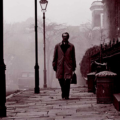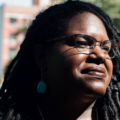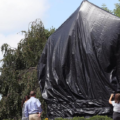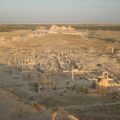Love song por La Condesa

On the night of September 19, 2017, I find a small map online of the oval park in front of my father’s house with its surrounding streets that extend out like spokes from a wheel. Drawn around the park, one block deep, is a thick red line enclosing the area of greatest damage. My father’s house falls inside this red line.
To see his home, a constant woven through my life, trapped inside this red wall, forces a low-lying grief to surface. A grief that hadn’t dissipated even after calling all of my family members, after numerous reassurances that everyone is fine, after being told that people are mobilizing to help one another; a grief that is simply the realization that one can lose a place as easily and completely as one can lose a face.
When I called my father after hearing the news on the radio, the first thing I heard was the wonder in his voice. Wonder at the force that had grabbed him and then passed, wonder at where he found himself. He described where he stood and what he could see, and his voice was my first view of the new world. He described the apartment building that had collapsed on his block, how its rubble spilled out in a hill into the street, how people were grabbing shopping carts from the Superama just the other way and were filling them with rocks to haul away. How people were forming chains as far as he could see to pass the pieces of the buildings they could lift away. And in the background I could hear other people talking asking questions, reassuring, wondering.

Sixteen years and eight days earlier I remember my father calling me, frantic, having been unable to reach me all day. After I hung up, alone in in my mother’s apartment—she was trapped out in New Jersey after all the bridges and tunnels entering the city were suddenly closed— I opened my computer to write to him because I wanted to continue to describe to him this new world I found myself in. Because it was wondrous and terrible, a place that I felt impelled to bear witness to.
In a tragedy, the second impulse after assessing physical wellbeing is to describe, to pass along the coordinates of your new location, the new culture, the new facts. Terror takes time to settle. Shock heightens the senses to such sharpness that it’s almost as if the body moves in a different substance, breathes a different air, is born into a different but similar world. Soon enough, of course, the new reality is absorbed. Fear and panic calcify, breaking the spell. But while it still weaves us in, we must communicate it, we must share it, we must map it, we must know it, not for ourselves, but for each other.
The morning after the towers fell, I could not stand to be alone so I went out into the city, and I found that a different city had replaced the one I knew, that the list of things destroyed included the walls between us. Strangers no longer existed. We had all woken up to the knowledge that every person is a point of connection, and through conversation we could reconnect ourselves, and through connecting we could rebuild community in the face of desolation. I have never known such humanity as I knew in that fall of 2001. And I hope I never will again as the key that unlocks that force is collective tragedy.
Later that afternoon my father sent me photographs of his building raked with cracks and my sister sent me a video of her running through the street in the minutes after the earthquake. Slow down, I though, wait, wait, I think I recognize this place—wait, where are you? and then the street I knew, that I didn’t know, opened into a colorless towering pile of ruins, people gathered thick buzzing around. Then the news started to pour in and the name of our little corner of Mexico City, La Condesa, was suddenly in everyone’s mouths.
Inundated with images I could not locate or place within my memory, I went for a walk in Google maps. Navigating footage of a place before it is touched by devastation is a little like listening to a dead person’s voicemail message. What once entered through one sense and bloomed to the others now cannot be answered anymore by your heart.
My progress is halting. If I move the cursor as fast as I would like to go, the landscape dissolves and I’m lost again. I look at the building that fell, I locate that mountain of crushed concrete I saw through my sister’s phone. It underlays what I see in my computer screen. Already my memory is thinning to accommodate the new reality.
I take a left and follow Calle Amsterdam which is the red ring separating the disaster zone from the rest of the city, and lurch along, looking at the sidewalks, the colors, the blurred out shapes of people, the details that I didn’t even remember remembering but when I see them soothe me with their familiarity. If I keep walking I will reach my favorite bookstore, where I have to request the kind clerks unwrap any book I am interested in buying from its clear plastic wrapping, and a little further the pristine bakery where the waitresses all wear pressed and flounced aprons. To the left on my homeward bend I’ll pass the pickup truck that drives up from Oaxaca once a week to sell white cheeses as dewy, fresh, and round as a babies’ head and that, before September 11, I would smuggle home in my suitcase when I returned to the States.
And if I continue straight I will eventually reach my father’s little office building, which sits just behind Nuestra Señora Carmen and just across from the Puerta Flores through which you can enter Chapultepec and pass, on the way to the Castillo, a stone lined hole where Monteczuma bathed. Sometimes I walked that way with my father and his dog in the morning when the sidewalks are freshly washed and the air is cool and wet and the sounds of the city are still a hushed offshore roar embroidered by the regular song-calls of the gas men. Sometimes I would meet him in the early afternoon for lunch and we would go out to one of the restaurants in the neighborhood where we would be joined by one of my uncles. They would tell embarrassing stories about each other and pull the waiters into their jokes. We would eat steak and drink red wine and then, before the afternoon rains began, we would head back home for a nap.

I know there will be a rebuilding, a recovery, a remembering of the victims, that soon enough I will be back there. And I also know that that any recovery will inevitably and unintentionally involve a covering over of my memories along with the tragedy. That despite the force of our will to return things to the way they were before, that before is now lost to us. I cannot unhear my father saying he will leave his home, one day soon, in a few years, after the real estate market recovers. And I cannot unknow that one day soon, Parque México, that small sweet heart of a wild, wonderful, beloved city, Parque México that I’ve walked in for so many years I think of it as my father’s, that I think there is a part of me that is always walking it, will no longer be, even tangentially, my own.
Condesa is my second home, which means I am not always here. It means I do not work here, so I spend my time waiting for others to be released from obligations. It means that I walk, and look, and wander when I’m here. That for as long as I can remember I’ve set out after breakfast to walk these circular looping streets that are the perfect ratio of cement and greenery; to drink the color of the walls of buildings; to stop, always, at the tiny paleteria a few blocks down hidden off the park; to stroll in the park endlessly; to pass the vendors with their high stacks of sparkling fried chicharrón, tangled airborne bouquets of colored balloons, or ranks of plastic cups overflowing with machete-hewn fruit; to pass lovers that nestle on every bench and the skateboarders in the porticoed plaza where tango lessons tinkle through the trees at night. If I’m lucky, and it’s that perfect time of spring, I’ll be bowered with the lacy violet of blooming jacarandas as I pass the man-made lake where the ducks and swans huddle and wait for children of an age I once was to throw them bread.
At the end of the day, from the store just there on the corner that my father passes on his way home, he brings me fruit. Strange orange shells with crispy wet seeds inside that you suck off a spoon; bready little guavas that fill the air with their flowery sweetness, a smell achingly absent from my life on this side of the border; mangos so sopping their juice escapes the mouth; green and red quenching tuna fruit whose hair-like thorns embed themselves for days deep in my finger pads; papayas ripe enough to cut with a butterknife.… And if he forgets, we walk outside to my stepmother’s favorite piña man a little ways away, in Parque España, which is quieter and sleepier with a little train for the children and a playground in which I discovered once I had a child of my own.
A few weeks after the earthquake, on the steps of a Harvard library, on an unseasonably warm fall day, a friend of mine, who also has connections to Mexico and to La Condesa, stops to sit with me. He tells me a story about a famous poet who lived there once who would take his guests on walks around the neighborhood and through the park and point out all the trees that were no longer there, that had fallen in the earthquake of ’85.
On Calle Laredo stood one of the forty buildings in Mexico that collapsed on September 19. It is the street where I was serenaded on the eve of my wedding. Earlier, in a bar just a few blocks away just outside that red circle, my primo was shocked to discover that I had never had a man wake me singing outside my house. As a wedding present, he kidnapped my husband-to-be then reappeared with him several hours later, drunk, under the balcony of my bedroom with a vanload of mariachis.
It was almost dawn. The city was as hushed as it would ever be. As someone who lived in New York for the larger part of my life, I flinched when the music began, ready for the neighbors’ curses. But they never came. A police car pulled up, lights flashing, its sirens silenced. The cops inside rolled down their windows and leaned on the sills to listen. Couples embraced each other behind parted curtains across the street. I could hear my father and his wife come quietly to the balcony in their room next door, my brother laugh in the shadows behind me. Down below in the park, past the band, my primo, my almost-husband, the dark outlines of a sparse audience assembled beneath the trees. The neighborhood, woken by a five-person band (with trumpet!) singing in the street in the darkest part of the night, smiling, not just at the music, but also at the gesture of love behind it.
Top and third photographs by Santiago Arau
About Chloe Garcia-Roberts
Chloe Garcia-Roberts, Contributing Editor, is the author of The Reveal (Noemi Press, 2015) and translator of Li Shangyin’s Derangements of My Contemporaries: Miscellaneous Notes (New Directions, 2014), which was awarded a 2013 PEN/ Heim Translation Fund Grant. Her work has appeared in BOMB, Boston Review, A Public Space, and Interim Magazine, among others. She lives in Boston and is the managing editor of the Harvard Review.





